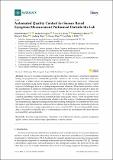| dc.contributor.author | Badawy, Reham | |
| dc.contributor.author | Raykov, Yordan P. | |
| dc.contributor.author | Evers, Luc J. W. | |
| dc.contributor.author | Bloem, Bastiaan R. | |
| dc.contributor.author | Faber, Marjan J. | |
| dc.contributor.author | Zhan, Andong | |
| dc.contributor.author | Claes, Kasper | |
| dc.contributor.author | Raykov, Yordan | |
| dc.contributor.author | Evers, Luc | |
| dc.contributor.author | Bloem, Bastiaan | |
| dc.contributor.author | Faber, Marjan | |
| dc.contributor.author | Little, Max | |
| dc.date.accessioned | 2018-12-04T18:47:20Z | |
| dc.date.available | 2018-12-04T18:47:20Z | |
| dc.date.issued | 2018-04 | |
| dc.date.submitted | 2018-02 | |
| dc.identifier.issn | 1424-8220 | |
| dc.identifier.uri | http://hdl.handle.net/1721.1/119428 | |
| dc.description.abstract | The use of wearable sensing technology for objective, non-invasive and remote clinimetric testing of symptoms has considerable potential. However, the accuracy achievable with such technology is highly reliant on separating the useful from irrelevant sensor data. Monitoring patient symptoms using digital sensors outside of controlled, clinical lab settings creates a variety of practical challenges, such as recording unexpected user behaviors. These behaviors often violate the assumptions of clinimetric testing protocols, where these protocols are designed to probe for specific symptoms. Such violations are frequent outside the lab and affect the accuracy of the subsequent data analysis and scientific conclusions. To address these problems, we report on a unified algorithmic framework for automated sensor data quality control, which can identify those parts of the sensor data that are sufficiently reliable for further analysis. Combining both parametric and nonparametric signal processing and machine learning techniques, we demonstrate that across 100 subjects and 300 clinimetric tests from three different types of behavioral clinimetric protocols, the system shows an average segmentation accuracy of around 90%. By extracting reliable sensor data, it is possible to strip the data of confounding factors in the environment that may threaten reproducibility and replicability. Keywords: Bayesian nonparametrics; clinimetric tests; Parkinson’s disease; pattern recognition; quality control; remote monitoring; segmentation; wearable sensors | en_US |
| dc.description.sponsorship | Michael J. Fox Foundation for Parkinson's Research (Grant 10824) | en_US |
| dc.description.sponsorship | Michael J. Fox Foundation for Parkinson's Research (Grant 12916) | en_US |
| dc.description.sponsorship | Michael J. Fox Foundation for Parkinson's Research (Grant 10231) | en_US |
| dc.description.sponsorship | National Institutes of Health (U.S.) (Grant P20 NS92529) | en_US |
| dc.publisher | Multidisciplinary Digital Publishing Institute (MDPI) | en_US |
| dc.relation.isversionof | http://dx.doi.org/10.3390/s18041215 | en_US |
| dc.rights | Creative Commons Attribution | en_US |
| dc.rights.uri | http://creativecommons.org/licenses/by/4.0/ | en_US |
| dc.source | Multidisciplinary Digital Publishing Institute | en_US |
| dc.title | Automated Quality Control for Sensor Based Symptom Measurement Performed Outside the Lab | en_US |
| dc.type | Article | en_US |
| dc.identifier.citation | Badawy, Reham et al. "Automated Quality Control for Sensor Based Symptom Measurement Performed Outside the Lab." Sensors 18, 4 (April 2018): 1215 © 2018 The Authors | en_US |
| dc.contributor.department | Massachusetts Institute of Technology. Media Laboratory | en_US |
| dc.contributor.department | Program in Media Arts and Sciences (Massachusetts Institute of Technology) | en_US |
| dc.contributor.mitauthor | Little, Max | |
| dc.relation.journal | Sensors | en_US |
| dc.eprint.version | Final published version | en_US |
| dc.type.uri | http://purl.org/eprint/type/JournalArticle | en_US |
| eprint.status | http://purl.org/eprint/status/PeerReviewed | en_US |
| dc.date.updated | 2018-11-22T14:25:23Z | |
| dspace.orderedauthors | Badawy, Reham; Raykov, Yordan; Evers, Luc; Bloem, Bastiaan; Faber, Marjan; Zhan, Andong; Claes, Kasper; Little, Max | en_US |
| dspace.embargo.terms | N | en_US |
| mit.license | PUBLISHER_CC | en_US |
